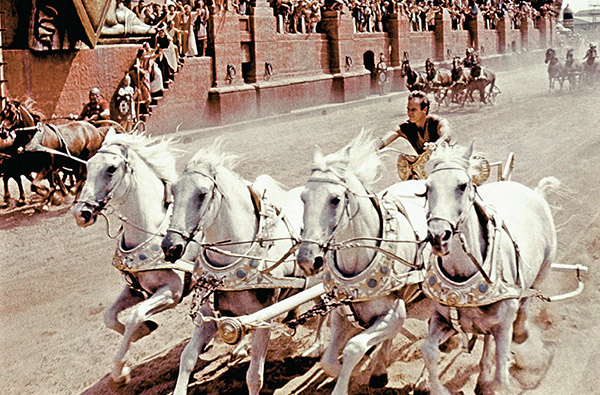3 reasons to see Ben-Hur again!
Posté le 17.10.2014 à 15h50
Screenings of the masterpiece by William Wyler all weekend at the festival

A thwarted love story
Childhood friends, as close as brothers, the Roman Messala and the Jewish Judah Ben-Hur find themselves reunited after years of separation. Following a political disagreement, the two friends turn against each other, leading the Roman to hate Ben-Hur to the point of ruining his life and that of his family. This story of political conflict as a backdrop seemed unconvincingly slight to director William Wyler to give this story the revenge an epic grandeur. He therefore appealed to the writer Gore Vidal, who invented a new past for the two characters: lovers in their youth, he said, they meet again years later. Messala wants to resume the relationship, but Ben-Hur refuses, resulting in a fierce hatred that burns in the rejected lover. The new scenario persuaded Wyler, who was nevertheless careful not to share the new plot with its star, Charlton Heston, knowing his hostility to homosexuality. However, Stephen Boyd (Messala) was told, and played his role accordingly. Pay attention to the passionate glances towards his partner; follow closely his dreamlike smiles and his craving for physical contact.
A real cinema villian
Stephen Boyd's Messala steals the limelight from Charlton Heston. His subtle acting, both virile and vulnerable under the weight of desire he feels for Ben-Hur, allows him to reach new heights in villainy. Is it not possible that Messala inspired director Ridley Scott and actor Joaquin Phoenix to create the terrifying Commodus in Gladiator? The greatness of the character also lies in the fact that Messala will not achieve redemption: by revealing to him the terrible fate suffered by his sister and mother, he sinks, striking back one last time at his enemy. Rejected by his beloved, Messala dies in a dignified death, worthy of the greatest tragedies
A grandiose setting
Seeing Ben-Hur again, the modernity and spectacular staging of William Wyler are astounding. The chariot race, a daring moment, took five weeks to shoot and required over 15,000 extras! Another important element that allows Wyler's film to age without seeming dated: the representation of Jesus. After all, the subheading of the novel by Lewis Wallace (1880) is "A Tale of Christ." But Wyler - unlike many of his contemporaries who didn't hesitate to cast run-of-the-mill bearded men with long hair and blue eyes to play these background Christs - decided never to show the face of Jesus. We never even hear him speak. It therefore gives a real presence and resonance of the importance of Christ in the story of Ben-Hur. All the modernity of Wyler is apparent in the crucifixion scene: the music stops, to let us hear the terrible sound of nails digging into the flesh of the stranger to whom Ben-Hur owes his life.
Better to see the original before… the remake!
A new Ben-Hur is in the works in Hollywood, starring the seductive Jack Huston (from Amercian television series Boardwalk Empire) under the leadership of director Timur Bekmambetov (Abraham Lincoln: Vampire Hunter), with Toby Kebbell (Dawn of the Planet of the Apes) playing Messala, and Pedro Pascal (Game of Thrones) in the role of Pontius Pilate.
Elsa Colombani
